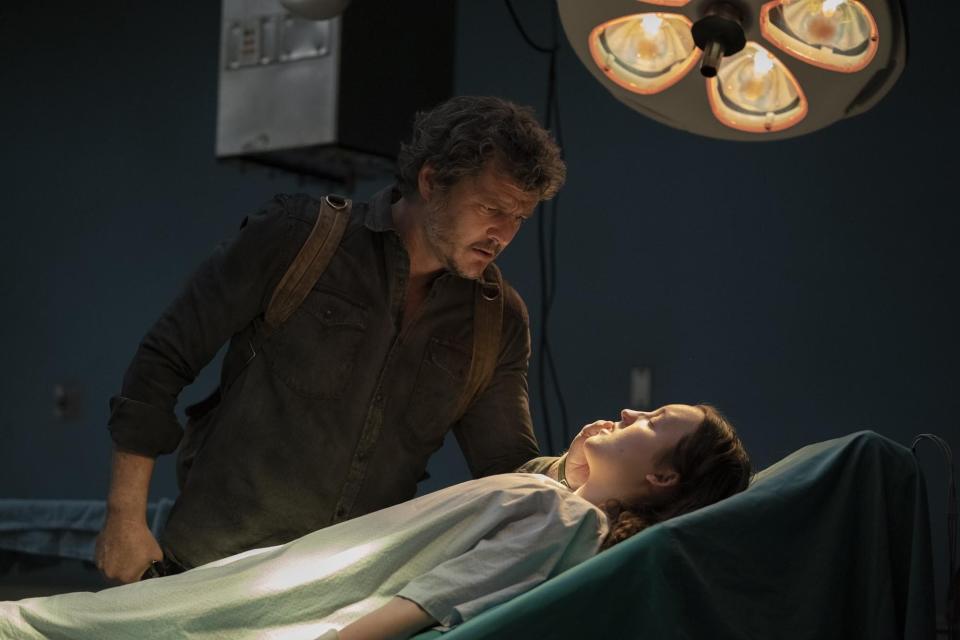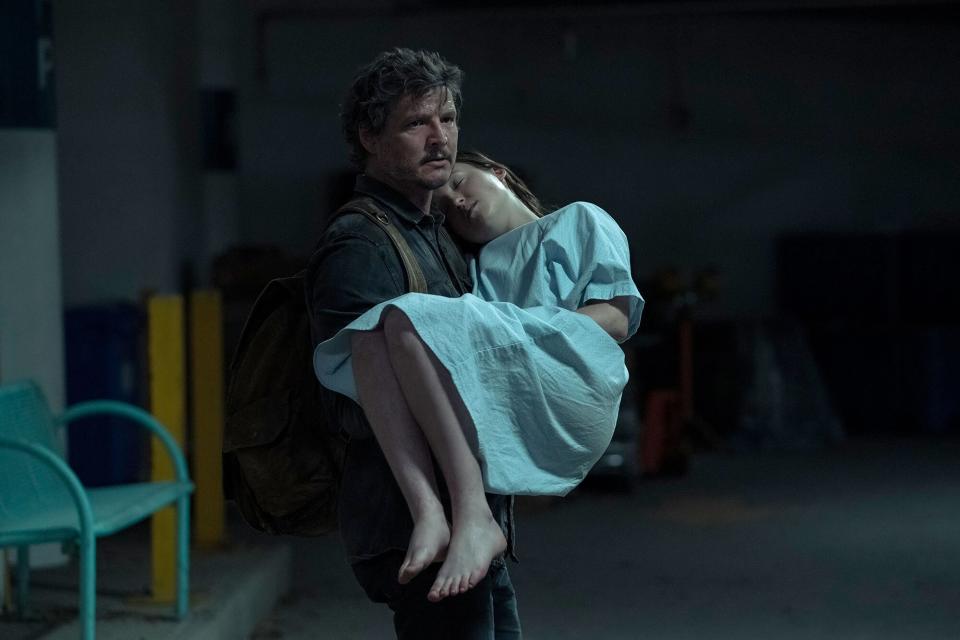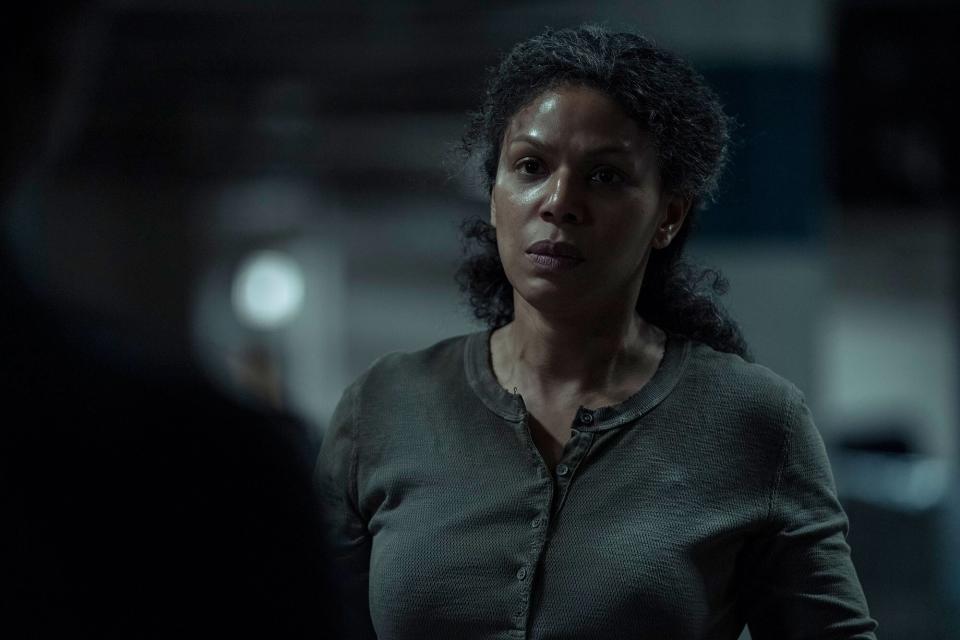Warning: This article contains major spoilers from The Last of Us season 1 finale.
It's said that love makes you do crazy things. How far would you go for the ones you love? Would you commit horrible acts if it meant protecting someone so precious to you?
These are the concepts at the heart of The Last of Us, both the original video game and the HBO drama, and they're ones that series creators Craig Mazin and Neil Druckmann have been priming their viewers to consider more and more over the course of the first season.
"Look for the Light," the ninth and final episode of season 1, finally sees Joel (Pedro Pascal) and Ellie (Bella Ramsey) make it to the Fireflies base at a Salt Lake City hospital. What they receive is not the warm welcome they were hoping for, as the rebels throw gas bombs at the pair and pistol-whip Joel into unconsciousness. He wakes to find a familiar face, Marlene (Merle Dandridge).
Ellie is being prepped for surgery, she informs him. Their doctors believe the cordyceps has been growing inside of her since birth, and, if the fungus can be extracted, they believe they can multiple the cells and create a vaccine to cure the world. But that good news comes wrapped in tragedy: If they remove the cordyceps from Ellie's brain, she will die.

Liane Hentscher/HBO Pedro Pascal's Joel and Bella Ramsey's Ellie in that climactic scene from 'The Last of Us' season finale
Marlene, whose history with Ellie's mom plays out in a flashback sequence, knows Ellie must die for the betterment of humanity. Joel doesn't see it that way. He kills the soldiers escorting him off the premises, grabs their weapons, and goes on a rampage. He kills everyone he finds in the hospital, including both the doctor set to operate on Ellie and Marlene, who makes one last appeal to Joel's conscience. With a heap of bodies in his wake, he departs with an unconscious Ellie in his arms.
It's a decision that gamers have been debating since the game first released in 2013. "I'm not suggesting that I have a hard opinion about how things go at the end — and I don't," Mazin said during a virtual press conference with reporters ahead of the finale's airing. "I'm confused about it morally. I think it's a difficult choice. I go back and forth, and I think a lot of people will go back and forth on it."
The ending hits differently in the show versus the game. In the game, the player experiences the story from Joel's perspective. Therefore, as Druckmann said, they become complicit in Joel's actions. When the moment comes for Joel to bust through the operating room door, the game doesn't give you the option to let the doctor live. You must actively press the button to kill him in order to progress through the sequence.
"It started with, for the game, how can we make the player feel the unconditional love a parent feels for their child, and this worry and fear and love and joy that can come with it?" Druckmann explained. "But then sometimes, when you love something unconditionally, your logic goes out the window and you will do really horrible things to protect the ones you love."

Liane Hentscher/HBO Joel (Pedro Pascal) carries an unconscious Ellie (Bella Ramsey) out of the hospital in 'The Last of Us'
"I like that unconditional love, we give that way too much credit," Mazin added. "It's the highest form of love. Unconditional means literally no conditions, none, including conditions whereby you really ought to be doing something that is not within the best interest of the person you love, at least according to some sort of moral code or a standard of ethics."
The show, without that element of player interaction, provides more background and context to ensure the ending packs just as much of an emotional punch. The sequence with Ellie's mother, Anna — made that much more impactful with original Ellie actress Ashley Johnson in the role — informs viewers of everything Marlene must sacrifice by choosing to let Ellie die. You also feel more for Joel after the horrific events brought on by David (Scott Shepherd) in last week's episode.
"It was just like, 'Here are all the different pieces that we have, the tools that we have within this story. How can we, with each episode, thematically touch on that in some way?'" Druckmann said of that main thesis of unconditional love. It's a throughline that began with Joel and Sarah in the premiere and weaved its way through the relationships of Tess and Joel, Bill and Frank, Kathleen and her late brother, Henry and Sam, Tommy and Maria, and even David and his flock, warped as his notions of love were.
"You have been, I think for the most part, in alignment with Joel, as far as what he's trying to do [to] protect Ellie. That's such a noble cause that he has," Druckmann continued. "And then how do we show this really sad thing that's more...? It's sad more than anything else to see the darkness he's capable of. So then it's about, how do we frame it with music? How do we shoot it? What are all the other tools we have to make you feel something very similar?"

Liane Hentscher/HBO Marlene (Merle Dandridge) tries appealing to Joel one last time in 'The Last of Us'
Mazin admitted he didn't think about the storytelling distinctions between the game and the show all that differently. Speaking to the idea of a player having a choice when confronted with Joel's actions in the game, he said, "I've played a lot of video games, so I know the difference between choosing and not choosing. There's a fantastic sequence in Bioshock that goes right to the heart of, just exactly how much choice do you think you have as a game player?"
Reflecting on his experience with the game, Mazin said he felt like he was being told a story and that he was part of that story, despite player choice. "To the extent that we can make people feel like the rest of the world goes away as they watch the television version of this story, I think we're arriving in the same place, which is you are experiencing the story that Neil wrote initially as the game and that we wrote as the show."
However, with the benefit of hindsight from having played the video game (in Mazin's case) and created the game (in Druckmann's case), the showrunners added elements into the show to lay the groundwork for the cataclysmic finale.
"We are aware of things as we built this season around the story of the first game that Neil and Naughty Dog weren't aware of when they told that story the first time around," Mazin said. "So there are certain little moments and things that we put in there, but ultimately, I don't think there's anything this season that contradicts what was already there in essence or explicitly in the game itself."
Sign up for Entertainment Weekly's free daily newsletter to get breaking TV news, exclusive first looks, recaps, reviews, interviews with your favorite stars, and more.
Related content:
"difficult" - Google News
March 13, 2023 at 09:00AM
https://ift.tt/u5J7ov0
The Last of Us finale ending: How the creators tackled Joel's 'difficult choice' for TV - Yahoo Entertainment
"difficult" - Google News
https://ift.tt/WEYqMld
https://ift.tt/SNw4Aba
Bagikan Berita Ini














0 Response to "The Last of Us finale ending: How the creators tackled Joel's 'difficult choice' for TV - Yahoo Entertainment"
Post a Comment